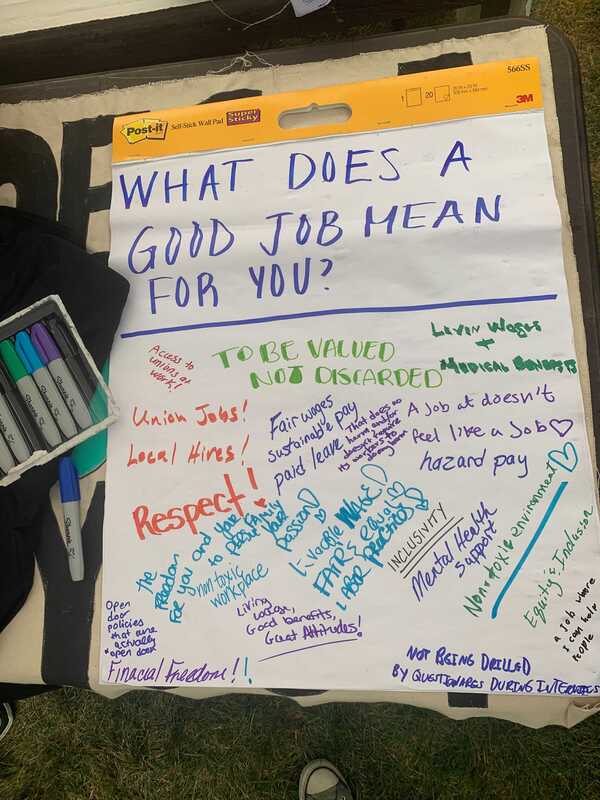|
On October 2nd, residents, workers, and families across Illinois gathered at Joliet Junior College on a rainy Saturday afternoon for Warehouse Workers for Justice’s Charged Up Festival. As rain showers came and went, attendees huddled under tents to talk to tabling organizations, participate in live screen printing, and enjoy the live local bands. Partnered organizations tabled to share their environmental justice work with attendees. Each group spoke about their vision for electrification, which is a national movement to mitigate the environmental degradation and devastating health impacts of diesel pollution in predominantly Black, Brown, and working-class communities nestled next to major industrial hubs. WWJ’s Charged Up event brought together community members and electrification advocates from across Illinois for conversations about how a transition to electric vehicles can bring cleaner air and better jobs to the working communities of color who currently work in and live close to the diesel-polluting warehousing and logistics industries.
The Little Village Environmental Justice Organization (LVEJO), a frontline community-led group in Little Village, the neighborhood with the second worst air quality in Illinois, hosted a table to share their work organizing to hold polluting industries accountable. Will County residents got the opportunity to connect with organizers fighting for environmental justice in another part of the heavily-trafficked I-55 industrial corridor. Milling around the tents, one could hear snippets of the powerful conversation between warehouse and logistics workers, truck drivers, organizers, activists, and residents across Illinois.
The Charged Up Festival was a milestone for WWJ’s Transit Justice campaign for better jobs and cleaner air for workers and residents in and around the nation’s largest inland port. With Lion Electric building the largest electric vehicle (EV) manufacturing plant in North America right here in Joliet and the passage of the Clean Energy Jobs Act (CEJA), Illinois is on a path towards a zero-emissions transportation future. Together, we are fighting to ensure that Black and Brown frontline communities have the decision-making power to locally adopt and implement electrification policies that benefit workers and families. WWJ’s Environmental Justice Leadership Committee (EJLC) is organizing to prioritize Will County’s working communities of color and bring them into the fold for electrification. By asking, “What does a good job mean to you?” WWJ’s environmental justice leaders engaged with their community’s vision for a good jobs and clean air future in Will County.
WWJ’s leaders and constituents demand that any industry that moves into Will County- even one that manufactures electric vehicles- provides fair, safe, and family-sustaining jobs. To make a just transition to electric trucks possible, workers and residents must have the power and the platform to make demands of the corporations that make annual record profits off of Will County’s exploited workforce. The national conversation around electrification provides an opportunity for us to uplift the voices of warehouse workers, truckers, mechanics, and EV manufacturers, who are coming together to improve labor standards across the supply chain while eliminating toxic diesel pollution from our air.
|
Archives
December 2023
WWJ News from 2016 and before can be read here: |

